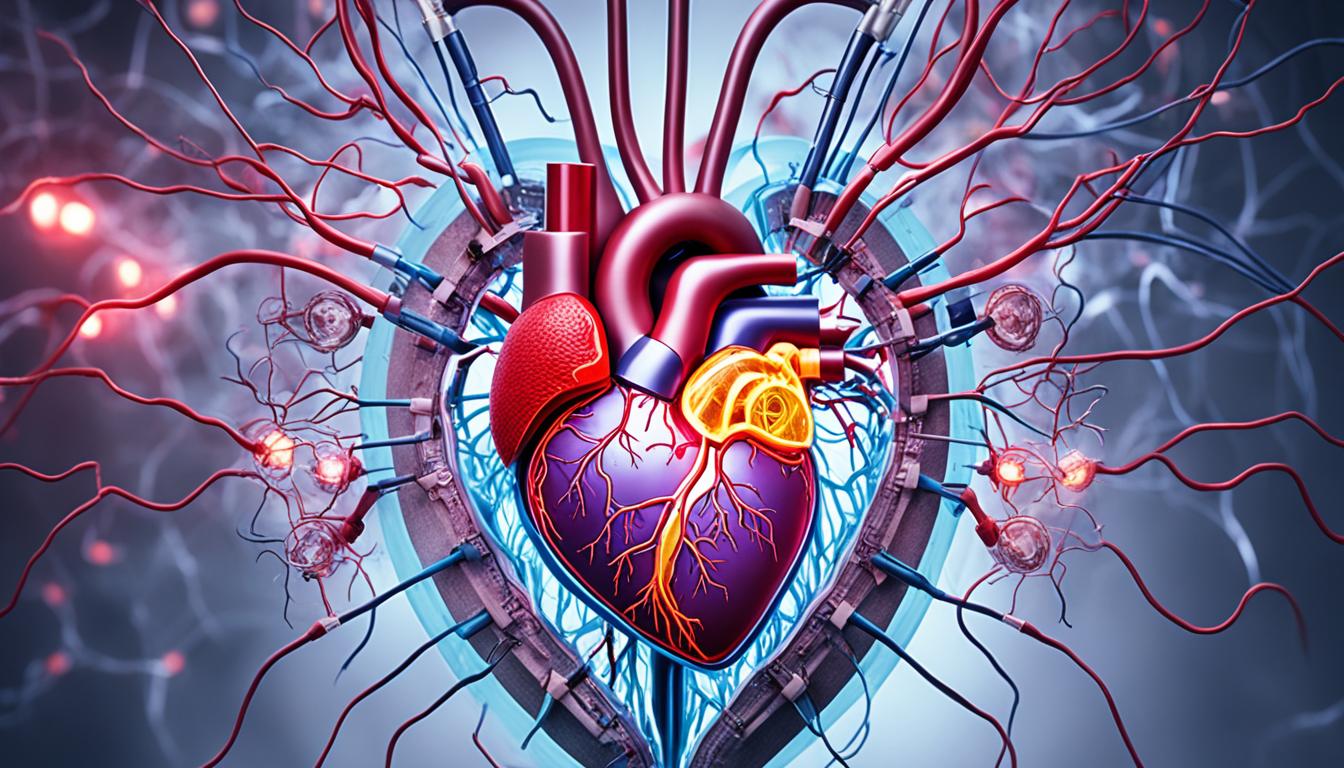VPCs stand for premature ventricular contractions, which are unusual heartbeats. They start in the ventricles and make the heart beat irregularly. This can feel like skipped beats or fast heart rate. Chest pain or discomfort is also common with VPCs.
Heart diseases, imbalanced electrolytes, and some drugs can cause VPCs. Doctors diagnose this condition by using an electrocardiogram (ECG) test. They check your heart’s electrical activity.
In some people, VPCs can lead to more serious heart rhythm problems. These can increase the chances of having a heart attack or stroke. The risk for these events becomes higher when VPCs are present.
Stem cell therapy is offering new hope to those with heart rhythm issues like VPCs. It uses special cells to fix damaged heart tissue. This process can help the heart work better.
Key Takeaways:
- VPCs are abnormal heartbeats that originate in the ventricles.
- They can cause symptoms such as heart palpitations and chest discomfort.
- Causes of VPCs include structural heart disease, electrolyte imbalances, and certain medications.
- Diagnosis is typically done through ECG monitoring and evaluation of symptoms.
- Recent advancements in stem cell therapy show promise in treating VPCs.
Causes and Mechanisms of VPCs
VPCs are abnormal heartbeats triggered by various factors. It’s key to know these to diagnose and treat them well.
Enhanced automaticity: VPCs might start when a part of the heart fires on its own. This can happen because of heart problems, imbalanced ions, and intense stress. These issues mess with the heart’s normal rhythm, causing irregular beats.
Re-entry: Abnormal signals in the heart can restart, causing a ripple of irregular beats. This re-entry can happen because of heart defects or from past heart issues or surgeries.
Triggered action potentials: Sometimes, the heart reacts strangely to triggers, leading to VPCs. Triggers can be stress, caffeine, some drugs, or mineral imbalances. These cause the heart muscle to act up, resulting in offbeat rhythms.
Spotting VPCs and figuring out how they start is essential for the right treatment. Tests like the 12-lead ECG are great for this. They show where and how the heartbeats go wrong, helping to understand their cause.
To get a better idea of how VPCs develop and affect the heart’s rhythm, check out this table:
Mechanisms of VPCs:
| Mechanism | Description |
|---|---|
| Enhanced automaticity | Spontaneous firing of an ectopic ventricular focus due to factors such as ischemic heart, imbalances in ions, and an increased adrenergic state. |
| Re-entry | Abnormal reactivation of electrical signals in the heart, often caused by structural heart abnormalities or scar tissue. |
| Triggered action potentials | Abnormal electrical impulses triggered by stimuli such as emotional stress, caffeine, medications, or electrolyte imbalances. |
Diagnosis and Treatment of VPCs
To find VPCs, doctors look at your health history and do a physical check. They also use tests like 12-lead ECG and echocardiogram. Other tests might include Holter monitoring, cardiac signal-averaged ECG, and MRI.
If you have VPCs, the treatment will change based on how bad your symptoms are. Changing your lifestyle can be the first step, like cutting out caffeine and tobacco. This can make your VPCs easier to handle.
For more serious issues, you might need treatments like catheter ablation. This stops the bad heart tissue causing VPCs. Or you might get an ICD which helps your heart beat right.
Stem cell therapy is an exciting option. It can repair your heart and make its rhythm better. Here, special cells are put into your heart to help it heal and work better.

